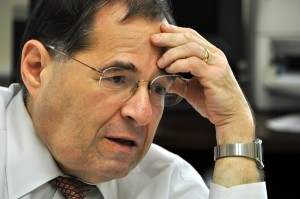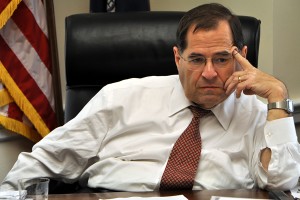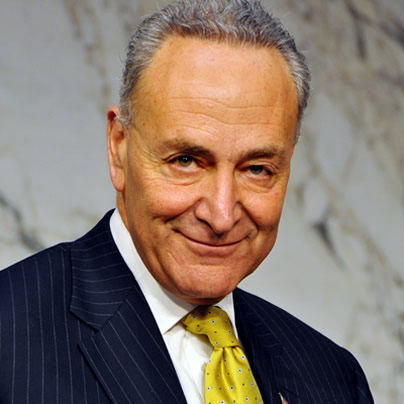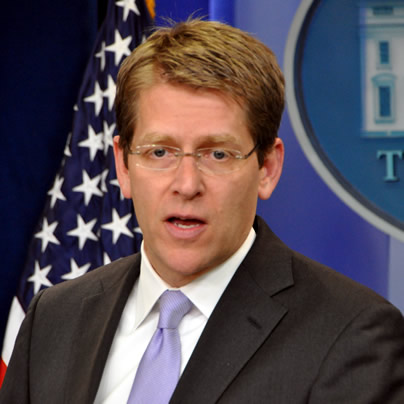National
No DOMA repeal next year: Nadler

Rep. Jerrold Nadler said the Respect for Marriage Act, which would overturn the Defense of Marriage Act, won’t pass next year. (DC Agenda photo by Michael Key)
The sponsor of a bill that would overturn the Defense of Marriage Act said repeal won’t happen in this Congress and that efforts next year will instead be focused on building support on the issue.
Rep. Jerrold Nadler (D-N.Y.) said in an interview with DC Agenda that lawmakers will work on passing other pro-LGBT bills next year, and could take up legislation to repeal DOMA — known as the Respect for Marriage Act — at the end of the two-year session starting in 2011.
“The Respect for Marriage Act is a bill that we can’t pass right now; we know we can’t pass it right now,” he said.
Nadler said Congress won’t take up the DOMA repeal next year because other LGBT-related bills, including the Employment Non-Discrimination Act, legislation providing partner benefits for LGBT federal workers and a repeal of “Don’t Ask, Don’t Tell,” are taking precedence. Supporters hope to pass those measures by the end of 2010.
“The Respect for Marriage Act comes up after that, maybe at the end of the next Congress, maybe afterward,” he said.
Nadler’s legislation would overturn DOMA, allowing the federal government to recognize same-sex marriages. It also has a “certainty provision” that would allow same-sex couples to marry in one state and still receive federal benefits even if they move to another state where gay nuptials aren’t recognized.
In lieu of passage in this Congress, Nadler said the task for supporters is to find more co-sponsors for the bill. As of Tuesday, the bill had 105 co-sponsors. Nadler predicted support would grow.
“And I think if some of these other bills pass, it’ll become more — the idea becomes less avant garde,” he said.
In response to Nadler’s remarks that a DOMA repeal won’t happen next year, Evan Wolfson, executive director of Freedom to Marry, said, “I don’t think we should begin the conversation about when it’s going to happen. I think we should begin the conversation with how do we build support and make it happen.”
“There are two ways to talk about our movement,” he said. “One is to talk about what it’s really about, to actually make the case for inclusion and fairness and freedom, to talk about why marriage matters. … The other is to spend all our time talking about the chess game or the political horse race, and we spend too much time on the latter and not enough time doing the former.”
Wolfson said supporters should begin the conversation “by each one of us calling our senators and member of Congress, asking them to sign on to the bill.”
Strategic decisions
Nadler’s prediction that a DOMA repeal won’t happen by the end of next year comes after other key potential supporters have said other LGBT legislation will be a priority.
At the time the Respect for Marriage Act was introduced in September, Drew Hammill, a spokesperson for House Speaker Nancy Pelosi, said the speaker is “focused on legislative items that we can enact into law now,” including ENDA.
And gay Rep. Barney Frank (D-Mass.) hasn’t signed on as a co-sponsor to Nadler’s bill, saying that lawmakers will instead focus on other LGBT issues this Congress and the bill’s certainty provision could cause political problems for House members seeking re-election.
Nadler said he hasn’t “had too many conversations” with Pelosi on the proposed DOMA repeal since it was introduced, but noted that the speaker has privately encouraged House members to co-sponsor the bill.
As for Frank, Nadler also said he hasn’t spoken much with the Massachusetts lawmaker on the issue since the bill’s introduction.
“We have a disagreement on the strategy on this obviously, as we had a disagreement on the strategy over the non-inclusive ENDA last [Congress] where we no longer have that disagreement,” he said. “And, I presume, in the end, we will not have a disagreement on this.”
Although supporters have said other bills will take priority this Congress, advocates for the DOMA repeal have hoped for congressional hearings on marriage by the end of next year.
But Nadler, who chairs a House Judiciary subcommittee with jurisdiction over marriage, said he wouldn’t commit to holding hearings on the issue by the end of next year and would hear only testimony “when we think it’s advantageous to do so.”
“And that’s a strategic decision, a tactical decision you have to make,” he said. “As things go on, we’ll have to see how things go. Right now, the thing is get the idea out there to get pressure built, to get more sponsors — and that’s the way to go.”
Asked whether Democratic leadership requested that he not hold hearings on marriage, Nadler replied, “No, they did not.”
Nadler said he expects a Senate companion to the Respect for Marriage Act would be introduced early next year, noting there are a number of potential sponsors for the Senate legislation.
Advocates have named Sen. Russ Feingold (D-Wisc.) as a prime target in talks because he chairs a Senate Judiciary subcommittee with jurisdiction over marriage. Nadler said Feingold would “possibly” champion the Senate legislation.
Nadler said a Senate bill has yet to emerge so many months after the House introduction in September because potential supporters have been occupied with other tasks.
“Some of the people we’re dealing with are very busy with a number of other things,” he said. “There’s not a sense of urgency, the sense that this bill has to have a Senate sponsor right now because it’s going to pass right now, because it’s not, so we’re talking.”
Even without a sense of urgency among lawmakers, Nadler said he thinks DOMA should be repealed because it’s “a stain on the national honor.”
“Even if you didn’t have a lot of practical effects, which obviously it does have, it’s wrong to keep such things on the books,” he said. “The honor of the country demands we repeal it.”
Same-sex marriage is only legal in five states throughout the country, but Nadler predicted that number would grow in coming years, and would include his home state of New York.
The Empire State was seen to be on the precipice of legalizing same-sex marriage, but the hopes of supporters were dashed last week when the state Senate killed a bill that would have granted marriage rights for same-sex couples. Nadler, who served in the New York Assembly for 16 years before being elected to Congress, said same-sex marriage will nonetheless be legalized in the state in a few years.
“I’d be very surprised if New York didn’t pass a gay marriage bill in the next two years, and I’ve been studying New York politics for 40 years,” he said. “And as long as we keep a Democratic governor and state Senate in the next election, we’ll get a gay marriage bill relatively soon in New York.”
As the number of states with same-sex marriage grow, Nadler said support for the Respect for Marriage Act also will build.
“Especially as a number of states have gay marriage, and the sky doesn’t fall in, and nobody comes in and busts up regular marriages — other than what’s busting up anyway — I think the issue will recede in the sense that people will lose their sense of the novelty,” he said.

Rep. Jerrold Nadler said of his home state that ‘as long as we keep a Democratic governor and state Senate in the next election, we’ll get a gay marriage bill relatively soon in New York.’ (DC Agenda photo by Michael Key)
Gay immigration bill could join reform debate
Another bill Nadler is championing in the House is the Uniting American Families Act, which would enable gay Americans to sponsor their foreign partners for residency. With an effort to pass comprehensive immigration reform expected in Congress next year, advocates are trying to include UAFA as a provision in the larger legislation.
Nadler said the White House seems to want to take on immigration reform in the spring and said UAFA supporters will “make a major thrust to make this part of the comprehensive immigration reform debate.”
The lawmakers drafting comprehensive immigration reform legislation are Rep. Zoe Lofgren (D-Calif.), Rep. Luis Gutierrez (D-Ill.) and Sen. Chuck Schumer (D-N.Y.). Nadler said it’s “hard to say” whether those bills would include a UAFA provision upon their introduction.
“There are a lot of cross pressures and we haven’t had those — we’ve started but we haven’t finished those conversations at this point,” he said.
But Steve Ralls, a spokesperson for Immigration Equality, said he’s “optimistic” immigration reform measures will include UAFA at their debut because supporters, including other lawmakers, immigration groups and LGBT groups, have been lobbying for an inclusive bill for some time.
“I don’t know what the final comprehensive immigration reform will look like, but I remain optimistic that it will include lesbian and gay families,” he said.
In the event that comprehensive immigration reform legislation doesn’t include UAFA when it debuts, Nadler said he’s working on making sure there are votes in the House Judiciary Committee to amend the bill to include such a provision.
Nadler said he’s “hopeful” there will be enough votes for an amendment, but added “that’ll be a big fight, if necessary.”
“I haven’t taken any votes or whip counts or done any kind of that work, but certainly it will be something that we’ll have to work at and the gay community and everybody will have to be pressuring the individual members of the committee,” Nadler said. “A lot of the members of the committee, the Democratic members especially, say they’re very great friends with the gay community … and this’ll be an opportunity to show that they are, bar none.”
One major obstacle that UAFA supporters will face is opposition from Catholic leaders. The U.S. Conference of Catholic Bishops has urged lawmakers to exclude the provision from immigration reform because church leaders support reform, but oppose the LGBT-specific provision.
Nadler said opposition to UAFA from Catholic leaders will make inclusion of the measure in the bill “a very difficult fight.”
“So, there will be some who will be tempted to say, ‘Wait a minute, let’s not alienate some of our major supporters on this legislation to pass it,’” he said. “There’ll be others of us saying, ‘Hey, no, if you’re doing a comprehensive bill, it’s got to be comprehensive. You can’t just leave certain people out.”
Even with opposition from Catholic leaders, Ralls said the list of religious groups who support the inclusion of UAFA in immigration reform “is very long and diverse,” and includes Quakers and Episcopalians.
“If the Conference of Catholic Bishops decides that they’re willing to throw the immigrant community under the bus because of the inclusion of LGBT couples, I think that would be a shame because, at the end of the day, immigration reform can help millions of families — both gay and straight — and that should be Congress’ priority.”
Asked whether he would support immigration reform legislation that doesn’t include a UAFA provision, Nadler replied, “I hope it doesn’t come to that.”
“All my efforts are designed to make sure it doesn’t come to that, so I’m not going to get into what happens at that point,” he said.
‘We will see a fair amount of action’
During his Agenda interview, Nadler also addressed arguments that the Obama administration and Congress haven’t made sufficient progress on LGBT issues since the start of this year.
The lawmaker said Congress has had a significant workload this year — including the passage of two annual budgets as well as stimulus and relief legislation for financial institutions — and that advocates for LGBT issues would be better to make judgments on Congress’ work at the end of next year.
“I think it would be very fair by the time the election rolls around next October to say we haven’t done enough on these issues,” he said. “I think a lot of things have been fermenting and cooking. I think we will see a fair amount of action on these issues in next year’s session.”
Asked whether President Obama could have spoken more forcefully on LGBT issues since the start of his administration, Nadler replied, “I think he could have been more forthright on some of them.” He declined to elaborate.
In response to recent criticism that lawmakers have been putting off action on ENDA, Nadler said some key supporters of the bill have been occupied with other issues. He noted the sponsor of the bill is Frank, who, as chair of the House Financial Services Committee, is also working on the Troubled Asset Relief Program legislation.
“Why aren’t we doing ENDA right now?” he said. “But what else are some of the key people doing? They’re over their heads with the financial reform, which no one anticipated six months ago. I suspect that once that is out of the way, which it should be soon, these kind of issues can come to the fore again.”
But John Aravosis, a gay blogger who has been leading an LGBT boycott of the Democratic National Committee, criticized the notion that Congress hasn’t acted on LGBT issues because lawmakers have been busy with other issues.
He said the Obama administration has found time to take swipes at the LGBT community by defending DOMA in court and, more recently, saying it couldn’t follow a court order from the Ninth Circuit judge to provide health benefits to the partner of a lesbian federal employee.
“It’s not enough just for them to say, ‘It’s been busy,’” he said. “Well, it hasn’t been busy — or so busy that they couldn’t take swipes at us.”
Aravois commended Nadler for being outspoken on LGBT issues, but questioned whether Nadler would criticize a Democratic Congress as a Democratic lawmaker, and whether Congress would, in fact, take up LGBT issues next year.
“Good luck passing gay rights legislation right before an election,” he said. “Democrats don’t have balls in off years — they certainly don’t have them right before elections, on gay issues especially.”
With regard to the LGBT legislation that Congress would take up next year, Nadler expressed uncertainty about the prediction that Congress would repeal “Don’t Ask, Don’t Tell” next year as part of the authorization bill for the fiscal year 2011 defense budget. Frank told the media last month that was the way he envisioned repeal.
But Nadler said repeal through the defense budget might not be the best way to overturn “Don’t Ask, Don’t Tell.” With the president calling for escalation of operations in Afghanistan, Nadler said such a provision would put more liberal members of Congress in a quandary over whether to vote for repeal and military operations at the same time.
“You don’t want to put people in the position of saying, ‘You vote against Afghanistan funding, you’re voting against [repealing] “Don’t Ask, Don’t Tell,”’ or vice-versa,” he said. “So maybe you need a new option or something. These are tactical considerations, which you have to look at as things unfold.”
Nadler said he, for example, didn’t “like this idea of sending more troops to Afghanistan,” although he supports a “Don’t Ask, Don’t Tell” repeal.
With public approval polls showing support waning for Democrats, Nadler predicted congressional Democrats will lose seats in the 2010 election, but added a hope that the party won’t lose “too many” seats. He noted that the November results would largely depend on how well the economy is faring.
Even with Democrats potentially in danger, Nadler said he didn’t think lawmakers would avoid LGBT issues next year to reduce a perceived risk of alienating voters before the election.
“I think we’re going to face most of these issues this Congress, mostly next year,” he said. “I’m assuming that the gay community is going to keep the pressure on. I mean, don’t go to sleep because I said it as that. If the gay community keeps the pressure on, then I think that, yes, we’ll probably face most of these issues.”
Federal Government
HHS to retire 988 crisis lifeline for LGBTQ youth
Trevor Project warns the move will ‘put their lives at risk’

The U.S. Department of Health and Human Services is planning to retire the national 988 crisis lifeline for LGBTQ youth on Oct. 1, according to a preliminary budget document obtained by the Washington Post.
Introduced during the Biden-Harris administration in 2022, the hotline connects callers with counselors who are trained to work with this population, who are four times likelier to attempt suicide than their cisgender or heterosexual counterparts.
“Suicide prevention is about risk, not identity,” said Jaymes Black, CEO of the Trevor Project, which provides emergency crisis support for LGBTQ youth and has contracted with HHS to take calls routed through 988.
“Ending the 988 Suicide and Crisis Lifeline’s LGBTQ+ youth specialized services will not just strip away access from millions of LGBTQ+ kids and teens — it will put their lives at risk,” they said in a statement. “These programs were implemented to address a proven, unprecedented, and ongoing mental health crisis among our nation’s young people with strong bipartisan support in Congress and signed into law by President Trump himself.”
“I want to be clear to all LGBTQ+ young people: This news, while upsetting, is not final,” Black said. “And regardless of federal funding shifts, the Trevor Project remains available 24/7 for anyone who needs us, just as we always have.”
The service for LGBTQ youth has received 1.3 million calls, texts, or chats since its debut, with an average of 2,100 contacts per day in February.
“I worry deeply that we will see more LGBTQ young people reach a crisis state and not have anyone there to help them through that,” said Janson Wu, director of advocacy and government affairs at the Trevor Project. “I worry that LGBTQ young people will reach out to 988 and not receive a compassionate and welcoming voice on the other end — and that will only deepen their crisis.”
Under Trump’s HHS secretary, Robert F. Kennedy, Jr., the agency’s departments and divisions have experienced drastic cuts, with a planned reduction in force of 20,000 full-time employees. The Substance Abuse and Mental Health Services Administration has been sunset and mental health services consolidated into the newly formed Administration for a Healthy America.
The budget document reveals, per Mother Jones, “further sweeping cuts to HHS, including a 40 percent budget cut to the National Institutes of Health; elimination of funding for Head Start, the early childhood education program for low-income families; and a 44 percent funding cut to the Centers for Disease Control, including all the agency’s chronic disease programs.”
U.S. Supreme Court
Supreme Court hears oral arguments in LGBTQ education case
Mahmoud v. Taylor plaintiffs argue for right to opt-out of LGBTQ inclusive lessons

The U.S. Supreme Court on Tuesday heard oral arguments in Mahmoud v. Taylor, a case about whether Montgomery County, Md., public schools violated the First Amendment rights of parents by not providing them an opportunity to opt their children out of reading storybooks that were part of an LGBTQ-inclusive literacy curriculum.
The school district voted in early 2022 to allow books featuring LGBTQ characters in elementary school language arts classes. When the county announced that parents would not be able to excuse their kids from these lessons, they sued on the grounds that their freedom to exercise the teachings of their Muslim, Jewish, and Christian faiths had been infringed.
The lower federal courts declined to compel the district to temporarily provide advance notice and an opportunity to opt-out of the LGBTQ inclusive curricula, and the 4th U.S. Circuit Court of Appeals determined that the parents had not shown that exposure to the storybooks compelled them to violate their religion.
“LGBTQ+ stories matter,” Human Rights Campaign President Kelley Robinson said in a statement Tuesday. “They matter so students can see themselves and their families in the books they read — so they can know they’re not alone. And they matter for all students who need to learn about the world around them and understand that while we may all be different, we all deserve to be valued and loved.”
She added, “All students lose when we limit what they can learn, what they can read, and what their teachers can say. The Supreme Court should reject this attempt to silence our educators and ban our stories.”
GLAD Law, NCLR, Family Equality, and COLAGE submitted a 40-page amicus brief on April 9, which argued the storybooks “fit squarely” within the district’s language arts curriculum, the petitioners challenging the materials incorrectly characterized them as “specialized curriculum,” and that their request for a “mandated notice-and-opt-out requirement” threatens “to sweep far more broadly.”
Lambda Legal, the Leadership Conference on Civil and Human Rights, PFLAG, and the National Women’s Law Center announced their submission of a 31-page amicus brief in a press release on April 11.
“All students benefit from a school climate that promotes acceptance and respect,” said Karen Loewy, senior counsel and director of constitutional law practice at Lambda Legal. “Ensuring that students can see themselves in the curriculum and learn about students who are different is critical for creating a positive school environment. This is particularly crucial for LGBTQ+ students and students with LGBTQ+ family members who already face unique challenges.”
The organizations’ brief cited extensive social science research pointing to the benefits of LGBTQ-inclusive instruction like “age-appropriate storybooks featuring diverse families and identities” benefits all students regardless of their identities.
Also weighing in with amici briefs on behalf of Montgomery County Public Schools were the National Education Association, the ACLU, and the American Psychological Association.
Those writing in support of the parents challenging the district’s policy included the Center for American Liberty, the Manhattan Institute, Parents Defending Education, the Alliance Defending Freedom, the Trump-Vance administration’s U.S. Department of Justice, and a coalition of Republican members of Congress.
U.S. Supreme Court
LGBTQ groups: SCOTUS case threatens coverage of preventative services beyond PrEP
Kennedy v. Braidwood oral arguments heard Monday

Following Monday’s oral arguments before the U.S. Supreme Court in Kennedy v. Braidwood Management, Inc., LGBTQ groups issued statements warning the case could imperil coverage for a broad swath of preventative services and medications beyond PrEP, which is used to reduce the risk of transmitting HIV through sex.
Plaintiffs brought the case to challenge a requirement that insurers and group health plans cover the drug regimen, arguing that the mandate “encourage[s] homosexual behavior, intravenous drug use, and sexual activity outside of marriage between one man and one woman.”
The case has been broadened, however, such that cancer screenings, heart disease medications, medications for infants, and several other preventive care services are in jeopardy, according to a press release that GLAAD, Lambda Legal, PrEP4All, Harvard Law’s Center for Health Law and Policy Innovation (CHLPI), and the Center for HIV Law and Policy (CHLP) released on Monday.
The Trump-Vance administration has argued the independent task force responsible for recommending which preventative services must be covered with no cost-sharing for patients is constitutional because the secretary of the U.S. Department of Health and Human Services can exercise veto power and fire members of the volunteer panel of national experts in disease prevention and evidence-based medicine.
While HHS secretaries have not exercised these powers since the Affordable Care Act was passed in 2010, Braidwood could mean Trump’s health secretary, Robert F. Kennedy Jr., takes a leading role in determining which services are included in the coverage mandate.
Roll Call notes the Supreme Court case comes as the administration has suspended grants to organizations that provide care for and research HIV while the ongoing restructuring of HHS has raised questions about whether the “Ending the HIV Epidemic” begun under Trump’s first term will be continued.
“Today’s Supreme Court hearing in the Braidwood case is a pivotal moment for the health and rights of all Americans,” said GLAAD President Sarah Kate Ellis. “This case, rooted in discriminatory objections to medical necessities like PrEP, can undermine efforts to end the HIV epidemic and also jeopardize access to essential services like cancer screenings and heart disease medications, disproportionately affecting LGBTQ people and communities of color.”
She added, “Religious exemptions should not be weaponized to erode healthcare protections and restrict medically necessary, life-saving preventative healthcare for every American.”
Lambda Legal HIV Project Director Jose Abrigo said, “The Braidwood case is about whether science or politics will guide our nation’s public health policy. Allowing ideological or religious objections to override scientific consensus would set a dangerous precedent. Although this case began with an attack on PrEP coverage, a critical HIV prevention tool, it would be a serious mistake to think this only affects LGBTQ people.”
“The real target is one of the pillars of the Affordable Care Act: The preventive services protections,” Abrigo said. “That includes cancer screenings, heart disease prevention, diabetes testing, and more. If the plaintiffs succeed, the consequences will be felt across every community in this country, by anyone who relies on preventive care to stay healthy.”
He continued, “What’s at stake is whether we will uphold the promise of affordable and accessible health care for all or allow a small group of ideologues to dismantle it for everyone. We as a country are only as healthy as our neighbors and an attack on one group’s rights is an attack on all.”
PrEP4All Executive Director Jeremiah Johnson said, “We are hopeful that the justices will maintain ACA protections for PrEP and other preventive services, however, advocates are poised to fight for access no matter the outcome.”
He continued, “Implementing cost-sharing would have an enormous impact on all Americans, including LGBTQ+ individuals. Over 150 million people could suddenly find themselves having to dig deep into already strained household budgets to pay for care that they had previously received for free. Even small amounts of cost sharing lead to drops in access to preventive services.”
“For PrEP, just a $10 increase in the cost of medication doubled PrEP abandonment rates in a 2024 modeling study,” Johnson said. “Loss of PrEP access would be devastating with so much recent progress in reining in new HIV infections in the U.S. This would also be a particularly disappointing time to lose comprehensive coverage for PrEP with a once every six month injectable version set to be approved this summer.”
“Today’s oral arguments in the Braidwood case underscore what is at stake for the health and well-being of millions of Americans,” said CHLPI Clinical Fellow Anu Dairkee. “This case is not just about legal technicalities — it is about whether people across the country will continue to have access to the preventive health services they need, without cost sharing, regardless of who they are or where they come from.”
She continued, “Since the Affordable Care Act’s preventive services provision took effect in 2010, Americans have benefited from a dramatic increase in the use of services that detect disease early, promote healthy living, and reduce long-term health costs. These benefits are rooted in the work of leading scientists and public health experts, including the U.S. Preventive Services Task Force, whose recommendations are based on rigorous, peer-reviewed evidence.”
“Any shift away from cost-free access to preventive care could have wide-ranging implications, potentially limiting access for those who are already navigating economic hardship and health disparities,” Dairkee said. “If Braidwood prevails, the consequences will be felt nationwide. We risk losing access to lifesaving screenings and preventive treatments that have become standard care over the past decade.”
“This case should serve as a wake-up call: Science, not politics, must guide our health care system,” she said. “The health of our nation depends on it.”
“We are grateful for the Justices who steadfastly centered constitutionality and didn’t allow a deadly political agenda to deter them from their job at hand,” said CHLP Staff Attorney Kae Greenberg. “While we won’t know the final decision until June, what we do know now is not having access to a full range of preventative healthcare is deadly for all of us, especially those who live at the intersections of racial, gender and economic injustice.”
“We are crystal clear how the efforts to undermine the ACA, of which this is a very clear attempt, fit part and parcel into an overall agenda to rollback so much of the ways our communities access dignity and justice,” he said. “Although the plaintiffs’ arguments today were cloaked in esoteric legal language, at it’s heart, this case revolves around the Christian Right’s objection to ‘supporting’ those who they do not agree with, and is simply going to result in people dying who would otherwise have lived long lives.”
“This is why CHLP is invested and continues in advocacy with our partners, many of whom are included here,” Greenberg said.
-

 Federal Government1 day ago
Federal Government1 day agoHHS to retire 988 crisis lifeline for LGBTQ youth
-

 Opinions1 day ago
Opinions1 day agoDavid Hogg’s arrogant, self-indulgent stunt
-

 District of Columbia20 hours ago
District of Columbia20 hours agoD.C. police seek help in identifying suspect in anti-gay threats case
-

 Theater4 days ago
Theater4 days ago‘Bad Books’ a timely look at censorship in local library









